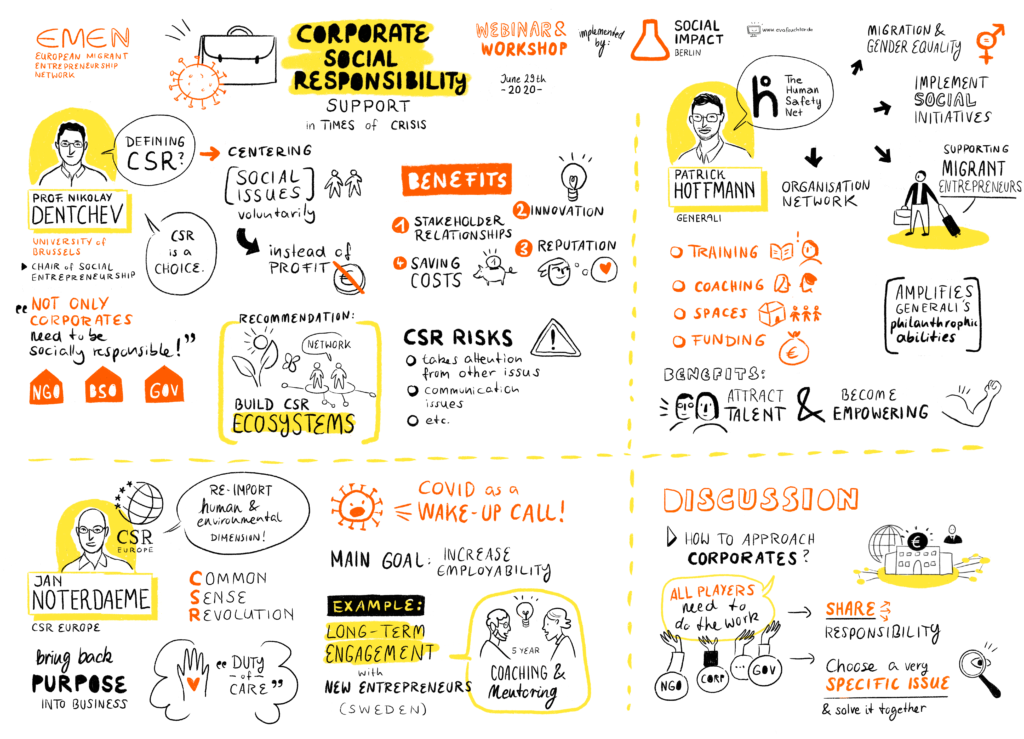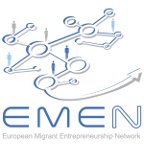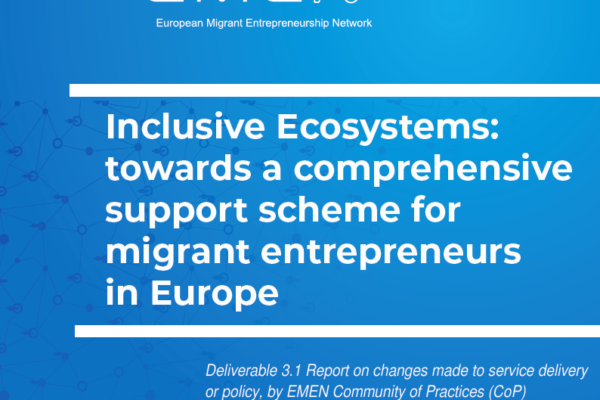On the 29th of July took place the fourth and last webinar of the Unlocking Diversity series, “Corporate Social Responsibility support in times of crisis”. The event was organized by UNITEE in collaboration with Social Impact.
The online event started with a presentation of Prof. Nikolay Dentchev on the topic of what Corporate Social Responsibility (CSR) is and what the potentials for the sector are.
The European Commission’s definition of CSR is “the responsibility of enterprises for their impact on society”. Prof. Dentchev explained that CSR drives the attention away from the economic dimension to the social end ecological impact of a venture to stakeholders and society. He underlined that it is a voluntary act.
Even if we often talk about the importance of CSR for large organisations, it should not be forgotten that it is a crucial choice also for small and medium-sized companies, NGOs and governments. Regarding Prof. Dentchev understanding, all organisations should be socially responsible and attentive to continuous improvement.
Why would organisations pay attention to CSR? Many believe that there is a link between social and financial performance, but this is not why so many turns to CSR. According to Prof. Dentchev, CSR is implemented because it is good to do so, not because of a business rationale.
Other factors beneficial created by CSR:
– Promoting a better relationship with stakeholders and strengthen their fidelity;
– The trust in the company will increase;
– Contribution to the creation of a positive image;
– The company may be able to see new efficiency and effectiveness;
– Helping in costs savings, risk management, and differentiation;
– Improvement of product, services and processes.
Many companies believe that there is not enough time nor budget for CSR. However, especially in times of crisis, it is crucial that firms, especially the large ones, act responsibly.
At the same time, being honestly involved in CSR initiatives exposes each organization to risks which are both organisational and relational (in particular: legitimacy destruction, issue ownership, poor risk communication).
Prof Dentchev, concluded by saying that there is the need to build a CSR ecosystem: it is important to see how others manage diversity, inclusiveness and the continuous improvement; to be involved with social entrepreneurs; to learn from others and be involved with experts from large international CSR ecosystems.
The online event continued with a concrete example of CSR: The Human Safety Net project implemented by Generali in Germany. It was presented to the audience by Patrick Hoffmann.
The Human Safety Net results from the CSR activities of Generali. In 2016, the company started to develop a new strategy to connect all the communities in Europe and have a common plan for sustainable running the business.
Generali identified that start-up support for refugees is still underestimated. The mission of The Human Safety Net is therefore to unlock the potential of people living in vulnerable circumstances so that they can transform the lives of their families and communities.
Generali decided to cooperate with 13 NGOs helping refugee entrepreneurs in 4 countries (France, Italy, Germany and Switzerland) and 14 cities: Social impact is one of them. A few principles and activities that all the organisations have in common are training, coaching, spaces and creation of communities and funding.
The results are impressive: 683 refugees have been involved and 101 start-ups created.
Moreover, Patrick Hoffmann presented 5 ways to connect migrant entrepreneurship with CSR:
– People, by corporate volunteering
– Product, by impact investing
– Network, by connections with public institutions and private sector
– Spaces, by physical footprint
– Voices, by corporate brand and communication
The third speaker was Jan Noterdaeme, from CSR Europe, the leading European business network for Corporate Sustainability and Responsibility. With its corporate members, National Partner Organisations (NPOs), and Associated Partners, CSR Europe unites, inspires & supports over 10,000 enterprises at local, European and global level.
Jan Noterdaeme explained that CSR starts on a very individual level: the women and men that have chosen to work in these organisations. At the beginning CSR Europe merely represented 10 companies, now it is a European wide organisation with 41 national and regional networks.
He stated that CSR could also stand for a “Common Sense Revolution”, as we all wish the same things: to live in a good, safe and equal place. CSR is a way to achieve this.
While CSR now is voluntary at the present state, he suggests that there will be no choice in the future: we all need to do something for the situation in which we are living, Mr Noterdaeme said that “We must care. We have the duty to collaborate if we want to make an impact and bring some change”. There is a need for more volume for CSR and for further collaboration to make a real impact.
All the speakers agreed on the fact that CSR could be a great opportunity for migrant entrepreneurs and aspiring entrepreneurs, as it can provide funding and training opportunities, as well as mentoring and support during the start-up and all life cycle of the enterprise.
The online event ended with a Q&A on these topics! You can find the result of the graphic illustrator, Eva Feutcher, below!




